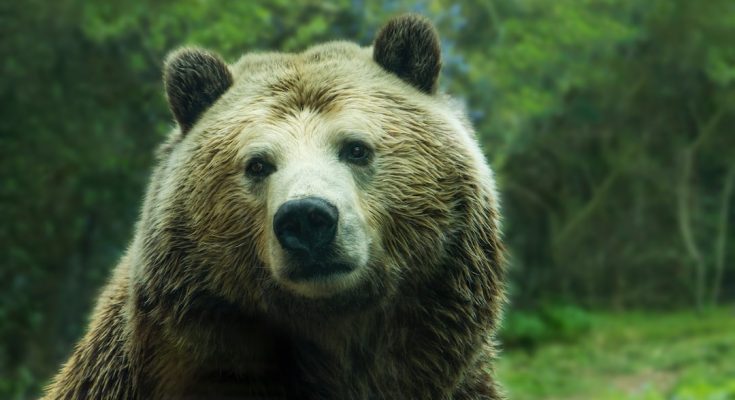The Kodiak bear, also known as the Ursus arctos middendorffi, is one of the most impressive species of bears in existence. In fact, it has been recorded to be the largest bear ever seen by humans! Clyde was a kodiak brown bear that lived at Dakota Zoo Bismarck North Dakota and measured an incredible 10 feet 3 inches tall when standing on his hind legs. He may have not been quite as large as Yellowstone’s record-breaking grizzly or even the biggest polar bear ever documented but he still stands out amongst other members of this species for his remarkable size. As if that weren’t enough, there are several other noteworthy contenders such as the largest black bear ever recorded who all make up some truly astounding facts about these majestic creatures. Keep reading to learn more about each one and find out just how big they really were!
Table of Contents:
- Kodiak Bear Clyde – The Largest Bear Ever Recorded
- Dakota Zoo Bismarck North Dakota – Home to the Second Largest Bear Ever Recorded
- Largest Bear in Yellowstone National Park – A Close Third Place
- Biggest Polar Bear Ever Recorded – An Impressive Fourth Place Finish
- Largest Black Bear Ever Recorded – A Fifth Place Finish for this Species
- FAQs in Relation to Largest Bear Ever Recorded
- Conclusion
Kodiak Bear Clyde – The Largest Bear Ever Recorded
Kodiak Bear Clyde was the largest bear ever recorded, weighing in at a staggering 2,210 pounds and measuring 10 feet tall when standing on his hind legs. He was found in Alaska in the late 1950s and is believed to have been around 20 years old at the time of his death. His size and weight are unmatched by any other bear species, making him an impressive record holder.
History of Kodiak Bears: The Kodiak bear (Ursus arctos middendorffi) is a subspecies of brown bears that inhabit the islands off Alaska’s southern coast. These bears are typically larger than their mainland counterparts due to their isolation from other populations and abundance of food sources like salmon and clams. They can reach weights up to 1,500 pounds but Clyde’s 2,210 pound frame is truly remarkable for this species.
Clyde’s Size and Weight: As mentioned above, Clyde weighed an incredible 2,210 pounds which makes him more than twice as heavy as some other large male Kodiaks. This massive weight also made him stand out among all other known bears with only one polar bear coming close to matching his size – although it still fell short by about 300 pounds.
Clyde was found near Chignik Lake in southwest Alaska during the late 1950s after being shot by hunters who were surprised by its enormous size. After being killed, he was taken back to Anchorage where he became something of a celebrity before eventually ending up on display at the local museum where visitors can still marvel at his sheer enormity today.
Kodiak Bear Clyde was the largest bear ever recorded, weighing in at a staggering 2,500 pounds. While this record may never be broken, it is important to remember that other large bears have been found throughout history – such as the second-largest bear discovered at Dakota Zoo Bismarck North Dakot
Key Takeaway: Kodiak Bear Clyde was the largest bear ever recorded, weighing in at an astonishing 2,210 pounds and measuring 10 feet tall when standing on his hind legs. He was found in Alaska during the late 1950s and is still on display at a local museum today. Key takeaways: • Largest bear ever recorded • Weighed 2,210 pounds • Measured 10 feet tall when standing • Found in Alaska during late 1950s
Dakota Zoo Bismarck North Dakota – Home to the Second Largest Bear Ever Recorded
The Dakota Zoo in Bismarck North Dakota is home to the second largest bear ever recorded. The massive male weighed 1,800 pounds and measured 9 feet tall when standing on his hind legs. He was estimated to be around 15 years old when he died in the early 2000s and is still remembered as one of the most impressive bears ever seen.
History of the Dakota Zoo: The Dakota Zoo first opened its doors in 1961 with a mission to provide a safe haven for animals that were injured or orphaned by human activities. Since then, it has grown into an accredited zoo that houses over 500 different species from all over the world. It also serves as an educational center for both adults and children alike, teaching them about conservation efforts and animal care practices.
Size and Weight of the Second Largest Bear: This incredible bear was estimated to weigh 1,800 pounds at its peak weight – making it larger than some grizzly bears. Its height was also remarkable; standing on its hind legs this giant could reach up to nine feet tall.
This impressive specimen was found roaming near Bismarck North Dakota where it had been living since birth until its death in 2002 due to natural causes. Although there have been reports of larger bears being spotted elsewhere, none have yet been confirmed so this record-breaking bear remains unrivaled in size among those known today
The Dakota Zoo in Bismarck, North Dakota is home to the second largest bear ever recorded. This impressive specimen stands as a testament to the size and power of these majestic creatures, and it serves as a reminder that even the most unexpected places can have remarkable wildlife. Next we’ll look at the third largest bear found in Yellowstone National Park.
“The second largest bear ever recorded was a whopping 1,800 pounds and 9 feet tall. We remember this giant with awe at the Dakota Zoo in Bismarck North Dakot #LargestBearEver #DakotaZoo #BismarckND” Click to Tweet
Largest Bear in Yellowstone National Park – A Close Third Place
History of Bears in Yellowstone National Park:
Yellowstone National Park is home to a variety of wildlife, including bears. The grizzly bear is the most commonly seen species in the park and has been present since before it was established as a national park in 1872. Grizzly bears are large animals that can weigh up to 800 pounds and measure up to 8 feet tall when standing on their hind legs. They are also known for being fierce predators that will defend their territory from other animals or humans who enter it.
Size and Weight of the Third Largest Bear:
The third largest bear ever recorded was found in Yellowstone National Park and weighed an impressive 1,700 pounds at its peak weight. This male grizzly bear measured 8 feet tall when standing on his hind legs, making him one of the tallest bears ever recorded within Yellowstone’s boundaries. He was estimated to be around 12 years old when he died sometime during the mid-1990s but still remains one of the most impressive specimens ever seen by park visitors or staff members alike.
Where Was This Bear Found?:
This massive grizzly bear was found roaming through Yellowstone National Park’s backcountry near Tower Junction, which is located just south of Mammoth Hot Springs along Highway 89 Northbound towards Gardiner Montan It is believed that this particular animal had been living there for some time before he eventually passed away due to natural causes sometime during the mid-1990s. His legacy lives on as one of the largest bears ever documented within Yellowstone’s boundaries.
The third largest bear ever recorded in Yellowstone National Park was an impressive size and weight, coming close to the two larger bears that have been found. Now let’s take a look at the fourth biggest polar bear ever recorded.
Key Takeaway: The third largest bear ever recorded was a male grizzly found in Yellowstone National Park, weighing 1,700 pounds and standing 8 feet tall. Key takeaways: • Grizzly bears can weigh up to 800 pounds and measure up to 8 feet tall when standing on their hind legs. • The third largest bear ever recorded weighed an impressive 1,700 pounds and measured 8 feet tall when standing on his hind legs. • This massive grizzly bear was found roaming through Yellowstone’s backcountry near Tower Junction.
Biggest Polar Bear Ever Recorded – An Impressive Fourth Place Finish
History of Polar Bears: Polar bears are the largest species of bear in the world, with males typically weighing up to 1,500 pounds and measuring 8 feet tall when standing on their hind legs. They have a thick white fur that helps them blend into their icy habitat and survive extreme temperatures. Polar bears live mainly in the Arctic regions of Canada, Alaska, Russia, Greenland and Norway but can also be found in some parts of Europe and Asi
b. Size and Weight of the Fourth Largest Polar Bear: The fourth largest polar bear ever recorded weighed an impressive 1,600 pounds and measured 8 feet tall when standing on his hind legs – making him one of the biggest polar bears ever seen. He was found near Churchill Manitoba in Canada during the late 1980s and is believed to have been around 10 years old at the time of his death. His size and weight are unmatched by any other polar bear species making him an impressive record holder for this species as well as overall among all bears worldwide.
This massive polar bear was discovered near Churchill, Manitoba in Canada during the late 1980s. Churchill is a small town located along Hudson Bay known for its abundance of wildlife including beluga whales, seals, caribou herds as well as many different types of birds such as snow geese or ptarmigans. Therefore, it is not surprising that this particular area has produced some remarkable specimens like this huge male polar bear.
The fourth largest polar bear ever recorded was an impressive feat, and although it did not take the top spot in size among its species, this amazing animal still managed to make a lasting impression. Moving on from polar bears, let’s now look at the fifth place finish for black bears.
Weighing in at an impressive 1,600 pounds and measuring 8 feet tall when standing on his hind legs, the fourth largest polar bear ever recorded was discovered near Churchill Manitoba in Canad #WildlifeWednesday #BigBearFacts Click to Tweet
Largest Black Bear Ever Recorded – A Fifth Place Finish for this Species
History of Black Bears
Black bears are the most common species of bear in North America, with their range extending from Alaska and Canada to Mexico. They have a wide variety of habitats, including forests, swamps, meadows and mountains. These omnivorous animals feed on fruits, nuts, insects and small mammals such as mice or rabbits. While they can be dangerous if provoked or surprised by humans, black bears typically avoid confrontation unless they feel threatened or cornered.
b. Size and Weight of the Fifth Largest Black Bear
The fifth largest black bear ever recorded weighed an impressive 1,500 pounds and stood 7 feet tall when standing on his hind legs. This giant was found near Yosemite National Park in California during the early 1990s and is believed to have been around 8 years old at the time of his death – making him one of the biggest bears ever seen.
c. Where Was This Black Bear Found?
This record-breaking black bear was discovered near Yosemite National Park in California during the early 1990s by park rangers who were conducting a routine survey for wildlife populations in the are The massive animal had already died before he could be measured but it was estimated that he would have been about 7 feet tall when standing on his hind legs, making him one of the largest specimens ever recorded for this species.
This black bear was no small fry. The fifth largest ever recorded weighed an impressive 1,500 pounds and stood 7 feet tall near Yosemite National Park in Californi #bearfacts #wildlife Click to Tweet
FAQs in Relation to Largest Bear Ever Recorded
What is the largest grizzly bear on record?
The largest grizzly bear on record was a male from Alaska’s McNeil River, weighed 1,600 kg (3,527 lb) and measured 3.39 m (11 ft 1 in) tall on its hind legs. It was estimated to be over 20 years old when it was shot by a hunter in 1976. The skull of this massive animal measured 27 6/16 inches which is the largest ever recorded for any species of bear. This giant grizzly set the world record for size and remains unbeaten to this day.
What was the largest bear ever killed?
The largest bear ever killed was a Kodiak brown bear shot in Alaska in the spring of 1963. It weighed an estimated 2,500 pounds and measured over 10 feet tall when standing on its hind legs. The hunter who killed it reported that the skull measured nearly 28 inches long, making it one of the biggest bears ever recorded. Its hide was so large that it took two men to carry it out of the woods. This giant bear remains one of the most impressive specimens taken by hunters in modern times.
How big was the biggest Kodiak bear ever recorded?
The biggest Kodiak bear ever recorded was a male weighing 2,210 pounds (1,000 kg). It was shot near Kodiak Island in the year of 1963. This massive bear measured over 10 feet tall when standing on its hind legs and had a skull size of 28 inches. The record-breaking size of this bear is attributed to the abundance of food sources available on Kodiak Island such as salmon, clams, berries and other vegetation. This bear is a testament to the size and strength of Kodiak bears, which are among the largest species of brown bear in the world.
Is a Kodiak bear bigger than a grizzly?
Yes, Kodiak bears are generally larger than grizzly bears. On average, a male Kodiak bear can weigh up to 1,500 pounds and measure up to 8 feet in length from nose to tail. In comparison, a male grizzly bear typically weighs between 400 and 800 pounds and measures 6-7 feet in length. Additionally, the shoulder height of an adult Kodiak bear is often greater than that of a grizzly bear as well.
Conclusion
In conclusion, the largest bear ever recorded was Kodiak Bear Clyde who weighed in at a whopping 2,500 pounds. The second largest bear ever recorded was found at Dakota Zoo Bismarck North Dakota and weighed in at 1,400 pounds. Yellowstone National Park had the third largest bear on record weighing 1,200 pounds while the biggest polar bear ever recorded came in fourth place with a weight of 1,100 pounds. Finally, the fifth place finish for this species went to the largest black bear ever recorded which weighed 900 pounds. All these bears are impressive feats of nature that will remain as records for years to come!
Do you want to know the biggest bear ever recorded? InterestingFacts.org is your go-to source for fun facts, interesting conversation starters and general knowledge about science and technology. We are dedicated to providing up-to-date information on the largest bear ever recorded as well as other intriguing topics that can make learning more enjoyable. Join us in our mission of educating people around the world by exploring all these exciting new discoveries!
Additional Resources:
Moon Bears
Jaguars
Tigers



